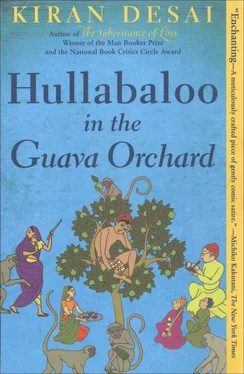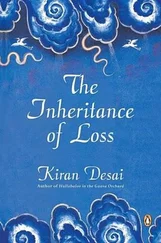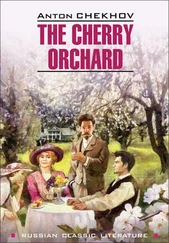‘Pheasants, peacocks, pomegranates,’ said Kulfi.
But again nobody heard her and Mr Chawla addressed his mother: ‘We are having an important discussion, and you are interrupting us with your talk of tiffin boxes! Do you want aloo bhaji, do you want radishes … here we are trying to talk about Sampath’s career prospects.’
‘But what am I talking about?’ she protested. ‘I am also talking about Sampath’s career prospects. If he didn’t eat properly, he would not even reach the office. He would fall into the gutter from hunger. Anyway, how can you sit all day and add up numbers when in your stomach there is a zero amount of food?’ she asked triumphantly.
‘Put whatever you want in the lunch boxes,’ he shouted back at her, bad-tempered. ‘What does it matter? Why don’t you think of something else for a change? What do you care if the sky falls on your grandson’s head so long as he has a gulab jamun in his mouth? No wonder the boy has turned out like this, spending his life at the bottom of a ladder.’
Sampath sat between them, looking as if he might just keel over.
‘He is like this,’ said Pinky, painting her nails in the morning sun that streamed through the window and surveying her hands with satisfaction. ‘He is like this by nature. But he should buy new shoes from Bata. Looking like that, he will not get anywhere.’
‘Oh, leave him alone,’ said Ammaji. ‘His stars are good. This is just a temporary phase. Give him a good head massage every day and the obstruction to his progress will go away.’
‘Phoo!’ Mr Chawla snorted. ‘Progress! Ever since he was born, this boy has been progressing steadily in the wrong direction. Instead of trying to work his way upwards, he started on a downward climb and now he is almost as close to the bottom as he could ever be.’
‘But the world is round,’ said Ammaji, pleased by her own cleverness. ‘Wait and see! Even if it appears he is going downhill, he will come up out on the other side. Yes, on top of the world. He is just taking the longer route.’
‘He is not taking any route, I tell you. He has missed the route altogether. He is just sitting by the side playing with flies.’ Mr Chawla turned back to Sampath, who had closed his eyes, imagining a long and peaceful sleep in a cool dark place. ‘Come on,’ his father urged him. ‘Get ready for work. It’s nine o’clock. Why are you still sitting here like a potato?’ He twitched with impatience. ‘What is the matter with this family? I am the only one with any sense of responsibility, any idea of the way things work in this world. If it wasn’t for me, Sampath would be sitting in a special museum for people who are a cross between potatoes and human beings.’ In the tone of a tour guide, he intoned: ‘Watch how this peculiar vegetable spends its day.’ And, to show just what he thought of the way this peculiar vegetable spent its day, he picked up his lunch box and marched, each footstep firm and loud, down the stairs on his way to work.
‘Pheasants, peacocks, pomegranates, potatoes … poor Sampath,’ murmured Kulfi to herself.
The post office, like so many government buildings, was painted yellow. Over the years, it had faded to match perfectly the haze of dust that enveloped Sampath each time he bicycled in to work. He took a short cut that led down the main bazaar road, through the hospital grounds and then under the barbed-wire fence that had been erected about the post office compound to establish it as a place sacred to official order and duty. Naturally, the barbed-wire fence was not entirely intact, for the residents of Shahkot, never ones to respect such foolish efforts, had set to work as quickly as they could to dismantle this unfortunate obstruction. All about their own houses and in their gardens and courtyards, they discovered a sudden need for wire; and all through the day, while, say, picking an annoying wedge of betel nut from between their teeth, or lifting their feet into a friendly lap for a foot massage, inspiration for wire-use struck them. They had always wanted to scratch their names upon the bark of a certain tree or across the dome of a certain protected monument. A curtain needed hooks. A gate, some sort of latch. There was a plant that would not stand up straight. A goat that tried to eat the plant. A dog that tried to bite the goat. An urgent need for fencing close to home. Soon there were gaps all around, and wherever there weren’t, one person or another had worked the wire up on stakes or trampled it down to allow for free movement about the town.
And so the post office stood in the middle of the hustle and bustle of Shahkot. Schoolchildren, beggars, potters and signboard painters. Cows and pigs and water buffaloes. Ikebana class teachers from the polytechnic. Mathematics tutors. Clerks from the asthma institute, and cooks. Lady doctors and the head of the mental asylum. Accountants. Hosiery products men. Umbrella repair men. A bread and egg man. A fish woman. Flies. A washerman barely visible beneath sheets and towels. An orange-robed sadhu smiling and bowing despite the heat. (Truly India is a land of miracles.) Scooters and rickshaws, trucks and cars. Everyone’s mother, father, uncle, sister-in-law and fourth and fifth cousin-brother twice and thrice removed. And Sampath on his way to work with Pinky sitting on the back seat of the cycle, charting a zigzag line through it all as he sought out the promise of coolness alongside walls and under trees and awnings, for the morning sun was already hot. Dashing from one blue pool of shadow to another, he conducted an erratic path through the crowd, which responded with snorts and shouts, a vast blowing of horns and utter chaos.
‘Stop!’ Pinky thumped her brother. ‘I am almost falling off the back here. Can’t you even cycle straight?’ They continued a bit farther. ‘Let me off.’ She hammered at him. ‘This is too much. I am going to take the public bus instead. You are making me feel sick.’
He stopped and, glowering at him, Pinky straightened her fantastic outfit of sunset polyester and strode towards the bus stop. He watched her, resting for a minute as he drank a glass of ice-cold water from the water man’s cart.
As the bus appeared around the bend, filled to bursting as usual, Pinky removed a hairpin from her hair so as to have a weapon against men who might misbehave on seeing such a pretty girl at close quarters. Throwing herself on to the overcrowded steps, hanging on, feet waving wildly in the air, she speared a man who was not only taking up too much room in her opinion, but had made the mistake of winking at her, unaware of whom he was up against. Sampath could hear him shouting in alarm as his voice carried out of the window of the bus and down the street.
Everyone on the bus shouted as well. Some in attempt to restore calm: ‘But why are you making such a big fuss about a little thing like a wink?’ Some in encouragement: ‘Very good. Good for you. You show him.’ Some disapproving and terse: ‘There are some ladies who should be made to walk to work.’ The bus disappeared in a billowing cloud of exhaust fumes.
When Sampath had finished coughing, he cycled on, taking a short cut that led through the hospital grounds, forgetting, as usual, to bend down low enough to pass under his own particular bit of raised wire when he reached the post office, so that a large tuft of hair was caught and wrenched from his head as he entered the compound. Perhaps it would later be claimed by the crows as a superior sort of nesting material. Was he, he wondered, an especially generous supporter of the increasing crow population of Shahkot? Would this make him prematurely bald? Or perhaps his hair, inspired by empty patches, would spring back thicker and more resilient than ever?
Читать дальше












